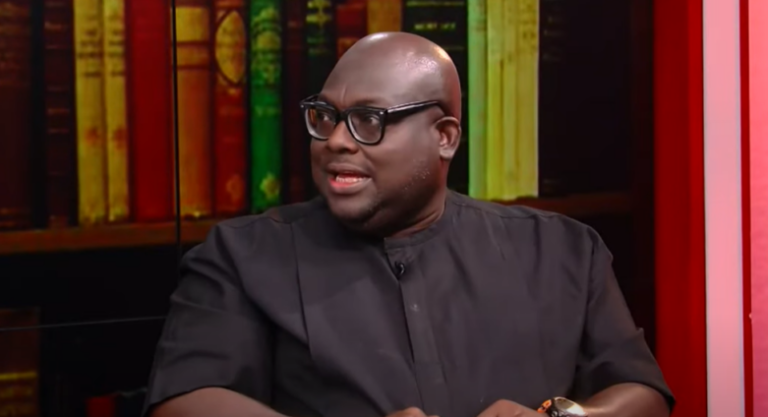Private legal practitioner, Nii Kpakpo Samoa Addo, has clarified that the lawsuit initiated by South Dayi MP Rockson-Nelson Dafeamekpor, on the Proper Human Sexual Rights and Family Values Bill is not aimed at coercing President Akufo-Addo into assenting to the bill.
According to him, while the President cannot be compelled to sign the Anti-LGBTQ Bill, he is obligated to adhere to the provisions of the 1992 constitution.
Therefore, if deemed necessary, a court order could be issued to compel the President to accept the bill in accordance with Article 106, Mr Addo said on The Law on JoyNews.
He stated that “we didn’t go to court to force the president to sign the bill, you can’t do that. We were in court to say that everything that parliament has to do, has been done, two the Speaker of Parliament is under duty pursuant to this section (Article 106) to carry the bill from parliament to the Presidency and the president has a duty to either sign the bill or not sign and refer it to the necessary bodies that are in the constitution.”
The private legal practitioner said that these reliefs are to ensure that the legislation process does not come to a standstill.
Furthermore, he noted that his client, South Dayi MP Rockson-Nelson Dafeamekpor, who initiated the lawsuit, is concerned about the potential establishment of a precedent if the President’s decision not to accept the bill is left unchallenged.
“Remember that laws are also made up of precedents, customs, usages, and others. If we have this as a precedent, next time, somebody too will come and say, ‘Well, I have a discretion whether to accept this bill’. So we wanted to ensure that we have legal interpretation on this particular matter,” Mr Addo said.
He said that a court order ensures that the Speaker and the President are compelled to do their duty as subjects to the Constitution.
Mr Addo explained that “When it’s now a court order, you can’t refuse it because then when you refuse it, there’s a sanction attached to it. Remember that the president, if there’s an order, he cannot refuse the order.”
He told the host Samson Lardy Anyenini that because the Speaker and President Akufo-Addo on the advice of the Attorney General interpreted the laws differently “the compulsive nature of the order was what was going to change the dynamics now.”
Mr Addo stated that because Ghana is a democratic state, through the court and its interpretation of the law, clarity can be sought on issues like these.
The Accra High Court has turned down a request to compel President Akufo-Addo to receive the Anti-LGBTQ+ bill.
In his suit, the MP sought several declarations and orders regarding the powers of the President under the 1992 Constitution of Ghana.
Mr. Dafeamekpor, among other things, asked for a declaration that, according to Article 106(1) and (7) of the Constitution, a President can only assent to or refuse to assent to a bill within seven days, unless the bill has been referred to the Council of State.
He was also seeking a declaration that the President cannot prevent Parliament from transmitting a bill that has been passed to him.
Justice Ellen Mireku in her ruling, however, indicated that the Court has jurisdiction, but dismissed the application using her discretionary powers.
She noted that two suits filed by private citizens Prof Amanda Odoi and Richard Dela Sky had direct implications on the mandamus application and hence could not approve the reliefs being sought by the South Dayi Member of Parliament
Passage of Anti-LGBTQ Bill
Parliament passed the Proper Human Sexual Rights and Ghanaian Family Values Bill, on Wednesday, February 28.
Among other things, the bill punishes those who take part in LGBTQ sexual acts, as well as those who promote the rights of gay, lesbian or other non-conventional sexual or gender identities with time in prison.
Although a section of the public have welcomed the bill, others including CHRAJ have raised many concerns including discrimination against people and their freedoms as stated in the constitution.
However, Member of Parliament for Ningo-Prampram, Sam George, says no part of the Proper Human Sexual Rights and Ghanaian Family Values Bill (Anti-LGBTQ Bill) infringes on the laws in the 1992 constitution.
Already, the Finance Ministry has advised President Akufo-Addo against signing it, expressing concerns that the country could face serious financial challenges if the president goes ahead to assent to the bill.
The ministry warned that Ghana could lose more than $3 billion in funding from the World Bank for various programmes and projects.
In response, President Akufo-Addo reassured the international community of Ghana’s commitment to upholding human rights despite the recent passage of the Proper Human Sexual Rights and Ghanaian Family Values Bill, popularly known as the Anti-LGBTQ+ Bill.
Addressing concerns during a diplomatic engagement, the President emphasised that Ghana remains steadfast in its long-standing reputation for respecting human rights and adherent to the rule of law.
He clarified that the Bill is facing a legal challenge at the Supreme Court and that until a decision is arrived at, no action would be taken by his government on the Private Member’s bill.
Desist and cease from transmitting the bill
Subsequently, the Office of the President in a letter dated March 18, 2024, requested Parliament to refrain from sending the anti-gay bill to President Akufo-Addo for his assent.
In the letter signed by the Secretary to the President, Nana Asante Bediatuo, the Presidency had explained that the decision stems from the acknowledgement of two pending applications for an order of interlocutory injunction before the Supreme Court.
The letter emphasised that it would be improper for Parliament to proceed with transmitting the Bill to President Akufo-Addo for any action until the matters before the court are addressed.
Furthermore, it was disclosed that the Attorney-General has advised the President against taking any action regarding the Bill until the issues raised in the legal suits are resolved by the Supreme Court.
Source: myjoyonline.com




